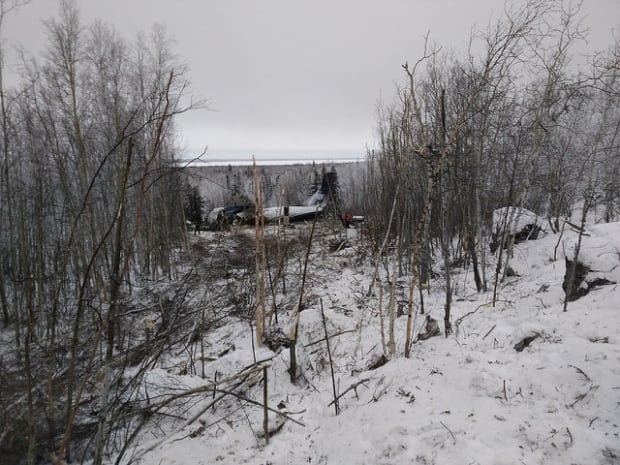Investigators will analyze two recorders to figure out what happened onboard the ATR 42 airplane that crashed near Fond-du-Lac, Sask. late Wednesday.
The 50-passenger plane is required to carry a cockpit voice recorder and a flight data recorder, according to a spokesperson with the Transportation Safety Board.
There were 25 people on board the plane when it crashed not far from the small airport. Everyone survived, although several were seriously injured.

The left passenger door of the aircraft after it crashed shortly in Fond-du-Lac. (Transportation Safety Board of Canada)

View of the crash site, which is approximately one kilometre west of the Fond-du-Lac airstrip. (Transportation Safety Board of Canada)
The recorders will give investigators a more detailed account of what happened.
The voice recorder captures conversation between the flight crew, as well as communication with air traffic control. It also records any ambient sounds in the cockpit or aural warnings, as well as the speed of the propellers.

The area where the plane crashed has been sectioned off by authorities. (Courtesy The StarPhoenix)
The flight data recorder works alongside different sensors on the aircraft, said the safety board.
The sensors record the aircraft performance measurements, such as the power settings of engines, the speed propellers were turning and what the flight control configurations were. It can also record how the pilots were using the flight controls.
Neither captures video, however.
Twenty-two passengers and three crew members were aboard the aircraft when it crashed shortly after takeoff on Wednesday from the Fond-du-Lac, Sask., airport. (Raymond Sanger)
The Transportation Safety Board said it will interview the pilots and other people on board as soon as possible.
Investigators from the safety board's bureau in Winnipeg arrived at the scene of the crash Thursday afternoon to start assessing the situation and begin collecting data.
It could take up to a year or so to know what happened.
"If we do uncover any serious safety deficiencies during the course of the investigation, we're not going to wait — we'll report on those publicly," J.P. Regnier, a senior investigator with the board's air branch, said Thursday.

Fond-du-Lac is a remote fly-in community in northern Saskatchewan. (CBC)
















